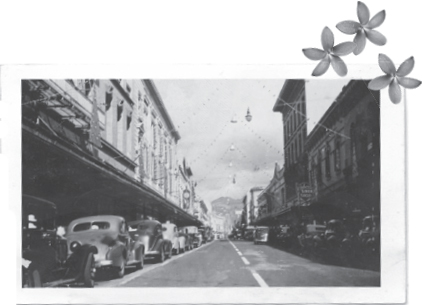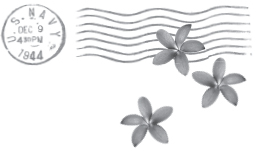

We went through the best part of town…Very nice houses and a Sears store is located way out on the edge of town. It’s a super-modern, one-story building as are most of the large stores in town.—February 9, 1945

Once again, my father wasn’t talking to me about the war. It was a strange turn. In such a short time, we’d gone from the joy of finding a bit of information that he seemed happy about, to the nightmares starting again. But I didn’t let much time pass. After just a few weeks, I made a decision: whether my father was willing or able to talk with me, I’d trudge ahead with reading the letters. This time, I wasn’t going to stop reading while he wasn’t talking.
I would simply take notes and ask him questions later, when he was up to talking. And if he never talked about it again, that would have to be OK too. I may have told myself this. But I don’t think I ever really believed it. What I really believed was that something was haunting my father. I couldn’t imagine what it might be. I also believed that this thing we’d started, this journey, there had to be a reason for it. There had to be a purpose.
Feb 26, 1945
Dear Folks,
Don’t believe I’ll ever get caught up on all my letter writing. Have been writing an average of about three a day since I’ve been here—including your daily one (almost). My friend from over headquarters way brought me six older ones last night from that letter famine of a couple of weeks ago. Five from you.
Whatever you do, don’t sell the Fiat. I want it to play with if you get tired of it.
At last heard all about the seat on the flivver anyway. Sure sounds like you did a good job Gerry. Keep it up and you’ll be just as good as your big brother some day. Now that’s really a high mark to shoot for. Just hope you can get in the car—you say you haven’t tried it yet. Remember the guy that built the boat in the basement!
And Gerry, I wouldn’t say Larry Flanagan has “all the luck.” They just love to get guys about his age. Give ’em a commission and then drop ’em behind enemy lines somewhere. We have a lot of Ensigns in the Navy that are younger than I am. They look to be 19 or 20, most of them. They just practically shoot themselves at the Japs.
As long as you know what island I’m on now and what I’m doing (mostly) I guess it’s O.K. Of course this whole place is alive with everything in the way of fighting goods and men. That’s the kind of stuff that is censored so will have to wait until I get back. Of course I can tell you what I do presently as long as it doesn’t go into military aspects (and there sure are plenty here).
Such hours you night owls keep—1:30 am. What’s this older generation coming to! You’ll have to kind of keep mom and dad in check Gerry. I like to get those Northern Pacific bulletins dad. I think when I get back I’ll just bid on something on every bulletin and see the whole division. Live in a trailer house.
Also think I’m going to write Mr. B.E. Nason at St. Paul and ask him about bidding on job while in service. I don’t think it can be done but looks like it isn’t quite fair if we can’t. Also going to ask him if they can or will allow me to take a leave of absence when I get out, to go to school or if I could work for a while first and then go. I would like to take advantage of the G.I. Bill of Rights. I think that could probably be arranged.
Oh well, that’s probably a day or so off yet. Someone says we’re going to be in Tokyo a year from now. That’s still too long to suit me.
Write. Love, Murray
So my father planned to tell his family all about it when he got back. Maybe he did. Now was as good a time as any to find out. Although he still didn’t seem to want to talk, there were other people who just might. Both of my grandparents passed away long ago but he had three siblings. Of Dad’s two brothers and one sister, his brother Raymond was the most likely to have the information I was looking for.
Raymond was a retired Certified Public Accountant who spent every spare moment he had researching genealogy. He’d traced our own family line back a few hundred years and then went to work on other people’s. It was his passion. He lived 150 miles away in Spokane, Washington, but he was always prompt in his responses to emails. So, I sent him one. In it, I asked what he remembered about what my father did during the war and about his homecoming. I hit send and stared at the “your message has been sent” screen.
Then I thought about my Aunt Iris. She lived just a mile or so down the road and I hadn’t seen her in a while. I was due for a visit anyway, so I grabbed my car keys and purse from the bird-shaped hook behind the door, and hopped in my car. Before starting the car, I checked my purse to be sure my small notebook was still there.
Iris opened the door smiling. She was quick to grab me a Pepsi as we passed through the kitchen. Even now, nearing her eighties, she was the kind of person who always made a point of keeping your favorites stocked up, just in case you dropped by.
In the living room, she sat next to a wicker basket that was overflowing with pastel-colored yarns. She’d knitted for as long as I could remember and that basket always held her most recent project.
“Who’s the blanket for?” I asked.
“Oh, a girl from church who’s having a baby,” she said.
That was Iris, always doing something for others. She’d even volunteered to make tiny hats for the newborn babies at the hospital.
“It’s pretty,” I said.
She pulled the half-finished blanket to her lap, and gently spread the yarn apart.
“Oh, it isn’t very good at all. See, this part here is smaller than this part,” she replied.
I’d learned not to argue with her. The things she made were beautiful, perfect. But she was humble to a fault, not wanting any adulation for it.
“Well, that little baby will love it,” I said. “You know, I’ve been transcribing Dad’s letters from WWII,” I explained.
“I heard.”
Her knitting needles clicked every now and then as she kept her hands busy while we talked.
“Oh, you did?” I asked.
“Murray told me you were doing that,” she said.
“Well, I have a question for you then.”
“OK. I doubt I can answer it though,” she replied.
When she looked down, watching her hands as she continued to knit, I took out my notebook and a pen.
“Did you know what Dad did during the war?” I asked.
“You mean the code-breaking thing?”
I nodded.
“Oh, I suppose I did. Well, I guess I knew he did something with code, but I’m not sure. But that’s about all I knew. We didn’t really talk about it,” she said.
I waited but there was no elaboration.
“In one of the letters to his folks, he said that he’d tell them what he did during the war after he got home.”
Iris thought for a moment, her knitting needles moving rhythmically.
“Well, everything in letters back then was censored, you know. He was probably afraid of getting into trouble if he said something he wasn’t supposed to,” she said.
Perfect, I thought. It was just the transition I needed.
“So, what about when he got back?” I asked. “What did he say about what he’d done during the war? Do you remember?”
“I don’t remember him saying anything at all,” she replied. “It was just a different time. We were all just glad the war was over and we could get back to our lives.”
“Yeah, I suppose that was probably true for a lot of people,” I said.
“You know,” she added, “the men who returned from the war, they just didn’t want anything except to get their jobs back and get back to work. They didn’t want anything special.”
What I’d learned about my father fit perfectly with what she was saying. But it hadn’t occurred to me quite that way before. To him it really was just ancient history; they were just old letters and an old man’s story. He’d probably been so happy to return from the war alive that he simply went back to his pre-war life. The things that had seemed so important during the war must have felt as far away as the miles between war and home. In that context, it made sense that he’d promised something in his letters that he never fulfilled when he got home. It simply hadn’t mattered to him anymore.
As we finished our conversation, I put my notebook and pen back in my purse, as inconspicuously as possible, without writing a word.
Back home, I checked my email and Raymond had not only responded, but he’d also called my other uncle, Gerald, in Hawaii to confer. But the information he shared was identical to what Iris had just said. Even after a few more prodding questions over a few more days, the end result was the same. My father had come home from the war and simply gone back to work. Neither of them even remembered any special dinner or celebration of any kind. It was as if he simply stepped back into his life after the war.
What must have felt right at the time, and was a reflection of the times, left many questions for those of us who didn’t live through it—especially those who were born years after it. In many cases those questions would remain unanswered forever. In the process of gathering information and sharing with others about the journey, I’d heard many a sad story. People shared their guilt and disappointment over not getting their father, or mother in some cases, to talk about their war experiences. Sometimes their stories would come on their deathbed. Sometimes they’d come after death, when letters or memorabilia were found, leaving the child with the unbearable burden of always wondering if there was something they should have said or done to encourage their loved ones to tell stories of their past. But their parents’ heroism was discovered too late.
My father’s siblings knew Dad had done work in naval intelligence and with some kind of a code, but that was all.
I’d hit the familiar brick wall once again. But I resolved to keep on trying to climb it.